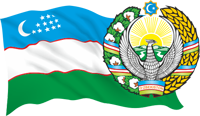 |
Head of educational-methodical department: |
Abdiev Azamat |
| phone: |
+(93)363 50 05 +(61)229 40 63 |
|
| e-mail: | abdiev79@mail.ru |
In order to ensure the effective solution of the tasks outlined in the Decree of the President of the Republic of Uzbekistan “On measures for further development of the higher education system” from April 20, 2017, it is necessary to improve and improve the quality of higher education, to strengthen the material and technical basis of higher education institutions modernization of the system of higher education for 2017-2021 with the aim of providing them with modern educational and scientific laboratories, information and communication technologies the approval of a comprehensive development program demonstrates the great attention paid to the educational process. The program envisages the creation of new study rooms, acquisition of new teaching and learning laboratories, and provision of audiences with computer equipment through the construction, reconstruction and overhaul of educational institutions, student dwellings, information and resource centers and other facilities. On the basis of the decision 2017/2018 academic year our institute opened Vocational Education: Bachelor of Education direction. During the 2018/2019/2020 academic year, there were 6 real and natural sciences teaching methods (Mathematics), Methods of teaching natural sciences and natural sciences (physics and astronomy), Mother tongue and literature (Karakalpak language and literature), Methods of teaching exact and natural sciences (geography ), The language of the mother tongue and literature (Russian), foreign languages and literature (English). Nowadays there are 9 faculties, magistracy departments and 27 departments, 23 bachelors and 8 masters are trained 466 professors and teachers. There are 2 academicians, 16 doctors of sciences and professors, 120 PhDs and associate professors. From 2017/2018 academic year, the Institute has organized three-stage (A1 → A2; A2 → B1; B1 → B2) training courses in order to gradually formally organize English language teaching subjects and targeted teaching staff in English. Upon completion of the course, professors of the institute receive a V2 certificate and have the right to study in the English language. Training courses are based on 68 modern teaching materials available today in the higher education institutions of the developed countries (recommended by the British Council). The 26 large auditors of the Institute have video-projectors, and professors and lecturers have the opportunity to lecture lectures using modern pedagogical technologies. Currently, the teaching staff of the Institute has 1 educational department manager, 4 methodologist, 7 dispatcher, 1 inspector, 1 technician, 1 businessman. Together with the Dean and Chairs headed by the Vice-Rector for Academic Affairs of the Educational-methodical Department, he conducts the following activities:
- – Ensure the implementation of decisions and decrees of higher education institutions, ministerial decisions, orders and instructions relating to the educational process;
- – Organization and control of preparation of deans and chairs for the new academic year;
- – Organization of educational process based on standard curriculum and curriculum developed according to the requirements of the State Education Standard;
- – To determine the staff unity of departments, taking into account the curriculum of the Institute and curriculum of students, as well as the formation of teaching staff and teaching materials;
- – To recommend to the Ministry candidates for the heads of state certification commissions;
- – Formation of the structure of state certification commissions and control over their activity;
- – Studying the supply of textbooks for students in the curriculum according to State Standards;
- – Supervision of the curriculum with complete teaching-methodological complexes, control over their refinement;
- – Monitoring and monitoring of statutory compliance with the student knowledge control system;
- – Preparation of proposals for the opening of new chairs, faculties, specialties in the Academic Council.



 (+998 61) 229-40-75
(+998 61) 229-40-75 nkspi_info@edu.uz
nkspi_info@edu.uz











